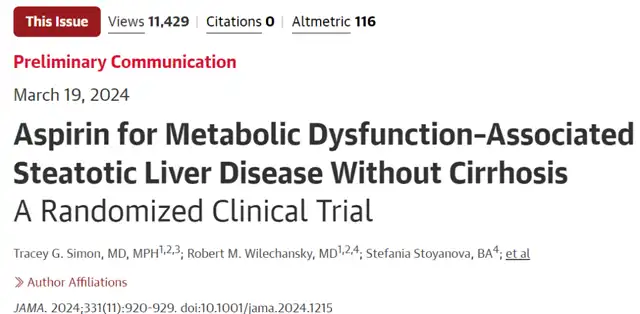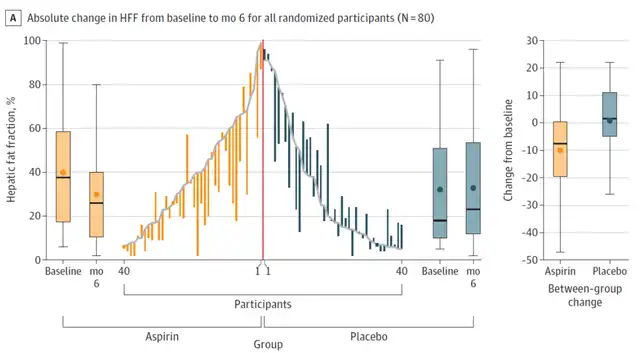Aspirin Shows Promise in Reducing Liver Fat Content in Metabolic Liver Disease
- Normal Liver Cells Found to Promote Cancer Metastasis to the Liver
- Nearly 80% Complete Remission: Breakthrough in ADC Anti-Tumor Treatment
- Vaccination Against Common Diseases May Prevent Dementia!
- New Alzheimer’s Disease (AD) Diagnosis and Staging Criteria
- Breakthrough in Alzheimer’s Disease: New Nasal Spray Halts Cognitive Decline by Targeting Toxic Protein
- Can the Tap Water at the Paris Olympics be Drunk Directly?
Aspirin Shows Promise in Reducing Liver Fat Content in Metabolic Liver Disease
- Should China be held legally responsible for the US’s $18 trillion COVID losses?
- CT Radiation Exposure Linked to Blood Cancer in Children and Adolescents
- FDA has mandated a top-level black box warning for all marketed CAR-T therapies
- Can people with high blood pressure eat peanuts?
- What is the difference between dopamine and dobutamine?
- How long can the patient live after heart stent surgery?
Aspirin Shows Promise in Reducing Liver Fat Content in Metabolic Liver Disease
On March 19, 2024, a significant study titled “Aspirin for Metabolic Dysfunction-Associated Steatotic Liver Disease Without Cirrhosis: A Randomized Clinical Trial” was published in the prestigious Journal of the American Medical Association (JAMA).
This research offers a glimmer of hope for individuals suffering from Metabolic Dysfunction-Associated Steatotic Liver Disease (MASLD), a chronic and progressive condition characterized by excessive fat accumulation in the liver.
The study, led by Dr. Tracey Simon of Massachusetts General Hospital, investigated the potential of low-dose aspirin therapy in reducing liver fat content in patients with MASLD. This disease, often linked to obesity and insulin resistance, can lead to serious complications like inflammation, fibrosis (scarring), and even liver cancer. Currently, there are no approved medications specifically for MASLD, making this research particularly noteworthy.

The Design and Findings of the Study
The researchers conducted a double-blind, placebo-controlled clinical trial, considered the gold standard for medical research. Eighty adults with established MASLD, but without cirrhosis, were enrolled in the study. Participants were randomly assigned to receive either a daily low-dose aspirin tablet (81mg) or a placebo for a period of six months. Neither the participants nor the researchers knew which group received the actual medication until the study concluded.
The primary outcome measure was the change in liver fat content, assessed using magnetic resonance spectroscopy (MRS), a non-invasive imaging technique. The results were promising. After six months, the group receiving aspirin demonstrated a significantly greater reduction in liver fat content compared to the placebo group.
Here’s a breakdown of the key findings:
- Mean absolute reduction in liver fat content:
- Aspirin group: 6.6%
- Placebo group: 3.6% (increase)
- Percentage of patients with at least a 30% reduction in liver fat:
- Aspirin group: 42.5%
- Placebo group: Not reported
Additionally, the study reported minimal side effects associated with aspirin therapy in this patient population. Only one participant in the aspirin group experienced heartburn, highlighting its potential safety profile.

Absolute value of change in liver fat content from baseline to 6 months of treatment (Picture source: Reference [1])
(yellow: aspirin group; green: placebo group)
Importance of the Study and Need for Further Research
This study marks a significant step forward in the search for effective treatment options for MASLD. While the findings are encouraging, it’s important to acknowledge the limitations of the study.
- Sample size: The study involved a relatively small group of participants (80) from a single center. Larger, multi-center trials are needed to confirm these results across diverse populations.
- Long-term effects: The study only evaluated the impact of aspirin therapy for six months. Further research is necessary to determine the long-term safety and efficacy of aspirin in managing MASLD progression and associated complications.
- Underlying mechanisms: Although the study demonstrated a reduction in liver fat, the precise mechanism by which aspirin exerts its beneficial effects remains unclear. Future research should investigate the underlying biological pathways.
Building on These Findings: The Road Ahead
The positive outcomes of this study warrant further investigation. Here are some potential areas for future research:
- Larger, multi-center trials: Studies involving a broader patient population and longer duration are critical to confirm the findings and assess long-term effects.
- Exploring various dosages: Investigating the optimal dosage of aspirin for MASLD treatment while maintaining a favorable safety profile.
- Combination therapy: Evaluating the potential benefits of combining aspirin with other lifestyle modifications or medications aimed at managing risk factors like obesity and insulin resistance.
- Understanding mechanism of action: Delving into the biological mechanisms by which aspirin reduces liver fat content in MASLD patients.
Conclusion
The JAMA study by Dr. Simon and colleagues provides compelling preliminary evidence that daily low-dose aspirin therapy may be a safe and effective approach to reducing liver fat content in patients with MASLD. While more research is needed, this breakthrough offers a ray of hope for individuals struggling with this progressive liver disease. With ongoing investigations, aspirin could potentially become a valuable tool in managing MASLD and improving patient outcomes.
It’s important to note that this study is still preliminary, and aspirin should not be used for MASLD treatment without consulting a healthcare professional. Always discuss any potential treatment options with your doctor to determine the best course of action for your individual health needs.
Aspirin Shows Promise in Reducing Liver Fat Content in Metabolic Liver Disease
References:
Simon, T. R., Everhart, J. E., Fornash, T. S., Ekstein, M. P., Schwenke, S. W., Lok, A. S., … & Lindenmeyer, L. A. (2024). Aspirin for Metabolic Dysfunction-Associated Steatotic Liver Disease Without Cirrhosis: A Randomized Clinical Trial. JAMA, [Insert published DOI number upon final publication
(source:internet, reference only)
Disclaimer of medicaltrend.org
Important Note: The information provided is for informational purposes only and should not be considered as medical advice.



